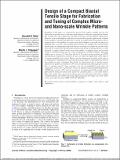Design of a Compact Biaxial Tensile Stage for Fabrication and Tuning of Complex Micro- and Nano-scale Wrinkle Patterns
Author(s)
Saha, Sourabh Kumar; Culpepper, Martin
DownloadCulpepper_Design of a compact.pdf (2.249Mb)
PUBLISHER_POLICY
Publisher Policy
Article is made available in accordance with the publisher's policy and may be subject to US copyright law. Please refer to the publisher's site for terms of use.
Terms of use
Metadata
Show full item recordAbstract
Wrinkling of thin films is a strain-driven process that enables scalable and low-cost fabrication of periodic micro- and nano-scale patterns. In the past, single-period sinusoidal wrinkles have been applied for thin-film metrology and microfluidics applications. However, real-world adoption of this process beyond these specific applications is limited by the inability to predictively fabricate a variety of complex functional patterns. This is primarily due to the inability of current tools and techniques to provide the means for applying large, accurate, and nonequal biaxial strains. For example, the existing biaxial tensile stages are inappropriate because they are too large to fit within the vacuum chambers that are required for thin-film deposition/growth during wrinkling. Herein, we have designed a compact biaxial tensile stage that enables (i) applying large and accurate strains to elastomeric films and (ii) in situ visualization of wrinkle formation. This stage enables one to stretch a 37.5 mm long film by 33.5% with a strain resolution of 0.027% and maintains a registration accuracy of 7 μm over repeated registrations of the stage to a custom-assembled vision system. Herein, we also demonstrate the utility of the stage in (i) studying the wrinkling process and (ii) fabricating complex wrinkled patterns that are inaccessible via other techniques. Specifically, we demonstrate that (i) spatial nonuniformity in the patterns is limited to 6.5%, (ii) one-dimensional (1D) single-period wrinkles of nominal period 2.3 μm transition into the period-doubled mode when the compressive strain due to prestretch release of plasma-oxidized polydimethylsiloxane (PDMS) film exceeds ∼18%, and (iii) asymmetric two-dimensional (2D) wrinkles can be fabricated by tuning the strain state and/or the actuation path, i.e., the strain history. Thus, this tensile stage opens up the design space for fabricating and tuning complex wrinkled patterns and enables extracting empirical process knowledge via in situ visualization of wrinkle formation.
Date issued
2015-09Department
Massachusetts Institute of Technology. Department of Mechanical Engineering; Massachusetts Institute of Technology. Laboratory for Manufacturing and ProductivityJournal
Journal of Micro and Nano-Manufacturing
Publisher
American Society of Mechanical Engineers (ASME)
Citation
Saha, Sourabh K., and Martin L. Culpepper. “Design of a Compact Biaxial Tensile Stage for Fabrication and Tuning of Complex Micro- and Nano-Scale Wrinkle Patterns.” Journal of Micro and Nano-Manufacturing 3.4 (2015): 041004. © 2015 by ASME
Version: Final published version
ISSN
2166-0468
2166-0476